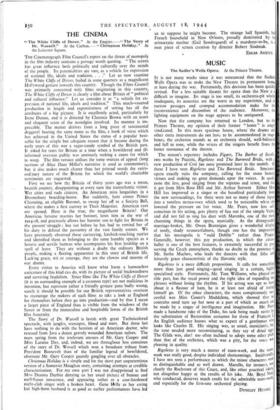THE CINEMA
44 The White Cliffs of Dover." At the Empire.---‘, The Story of Dr. Wassell." At the Carlton.—,' Christmas Holiday." At the Leicester Square.
THE Cinematograph Film Council's report on the threat of monopoly in the film industry contains a passage worth quoting. " The screen has great influence both politically and culturally over the minds of the people. Its potentialities are vast, as a vehicle for expression of national life, ideals and tradition. . ." Let us now examine The White Cliffs of Dover, hailed in some quarters as a magnificent Hollywood gesture towards this country. Though the Films Council was primarily concerned with films originating .in this country, The White Cliffs of Dover is clearly a film about Britain of " political and cultural influence." Let us consider it as "a vehicle for ex- pression of national life, ideals and tradition." This much-vaunted production in length and expensiveness of setting has all the attributes of a big picture. It is excellently acted, particularly by Irene Dunne, and it is directed by Clarence Brown with an acute and eloquent sense of the nostalgias involved. Its manner is im- peccable. The matter derives from a long piece of sentimental doggerel bearing the same name as the film, a book of verse which has achieved in the United States the status of a popular best- seller for the simple but adequate reason that it became during the early years of this war a sugar-candy symbol of the British past. It asked for tears for Britain at a time when a bewildered and ill- informed overseas public was anxiously seeking a cause for which to weep. The film version utilises the same sources of appeal (long sections of Alice Duer Miller's narrative is used as commentary), but it also makes much clearer than her printed words the extra- ordinary nature of the Britain for which the world's charitable sentiments are requested.
First we see how the Britain of thirty years ago was a mean, brutish country, disappointing at every turn the transatlantic visitor. Wet cities and rude citizens. An American miss languishes in a Bloomsbury boarding-house. But suddenly, here comes Prince Charming, an eligible Baronet, to sweep her off to a Society Ball, where she makes a first curtsey to Their Majesties. American eyes are opened. Here is the true, the magnificent Britain! Our American heroine marries her baronet, loses him in the war of 1914-18, and graciously allows her baronet son to fight for Britain in the present' struggle ; but not before he has had to remind her of his duty to defend the peasantry of the vast family estates. We have previously observed these curtseying, forelock-touching rustics and identified them as belonging to the same humble species as a lunatic and servile batman who accompanies his first lordship on a spell of leave. They are without a doubt the ordinary British people, making a fleeting appearance in this story of British life. Lack;ng grace, wit or courage, they are the clowns and morons of our drama.
Every visitor to America will know what harm a humourless caricature of this kind can do, with its picture of social backwardness and surviving feudalism. Since films like The White Cliffs of Dover (it is an outstanding example of a co:nmon type) are not malicious in intention, but represent rather a friendly gesture gone badly wrong, surely it should be possible for our British representatives overseas to encourage the makers of such films to take a look at England for themselves before they go into production—and by that I mean a larger piece of England than is visible from the windows of the Savoy or from the immaculate and hospitable lawns of the British film fraternity.
The Story of Dr. Wassell is lavish with great Technicolored spectacle, with jungles, seascapes, blood and tears. But these last have nothing to do with the heroism of an American doctor, who rescued from Java a dozen gravely wounded American sailors. The tears spring from the irrelevant amours of Mr. Gary Cooper and Miss Laraine Day, and, indeed, we are throughout less conscious of the story of Dr. Wassell which won a broadcast tribute from Pres;dent Roosevelt than of the familiar legend of bewildered, obstinate Mr. Gary Cooper gauntly gangling over all obstacles.
Christmas Holiday is a simple and for the Most part unpretentious version of a Somerset Maughan story, containing attempts at credible characterisation. For my own part I was not disappointed to find Miss Deanna Durbin denying us her usual picture of buxom and melbfluous innocence, and appearing rather as a case-hardened night-club singer with a broken heart. Gene Icklly as her erring but high-born husband is as good as earlier performances have led us to suppose he might become. The strange half Spanish, half French household in New Orleans, proudly dominated by the aristocratic mother (Gail Sondergaard) of a murderer-to-be, is a neat piece of screen creation, by director Robert Siodmak.
EDGAR ANSTEY.






















 Previous page
Previous page